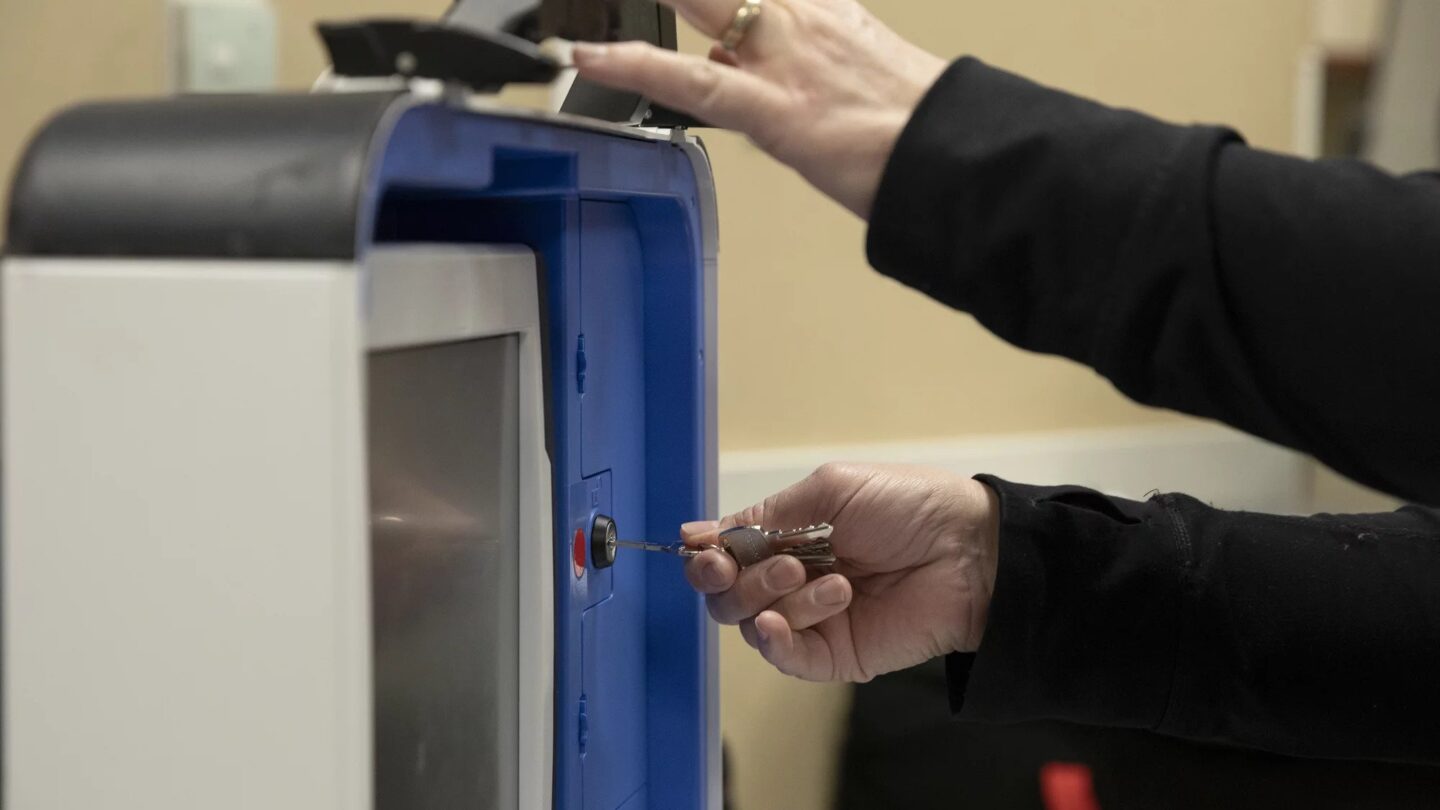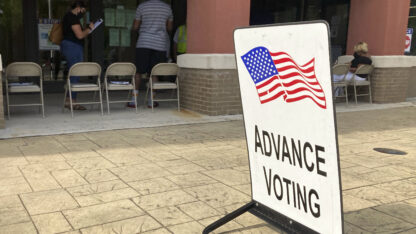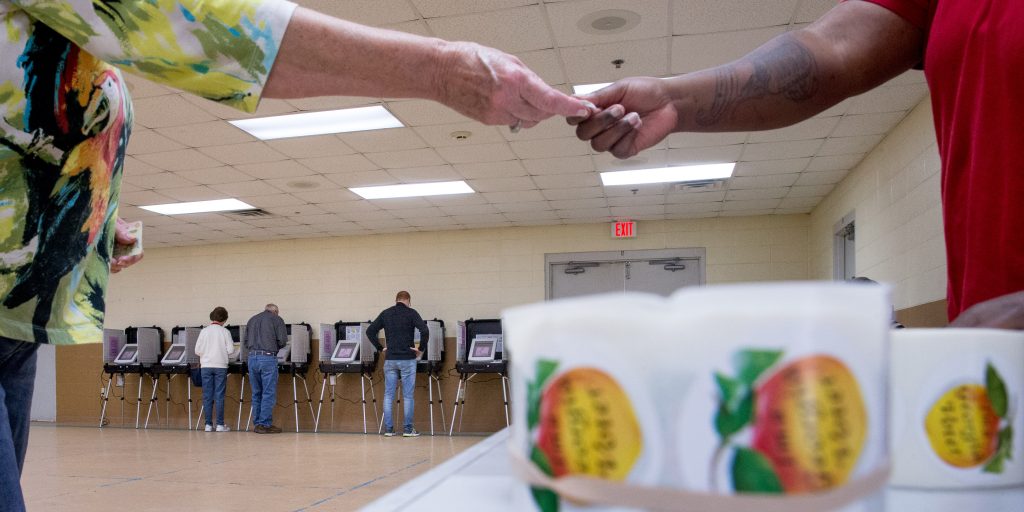This year, for the first time, Roebuck is preparing his poll workers for the possibility that one of those among them could try to sabotage democracy — by interfering with an election.
It’s a scenario that seems more plausible than it did a few years ago, thanks in part to a video of Ryan Kelley, a Republican candidate for Michigan governor, that made headlines this year.
“If you see something you don’t like happening with the machines, if you see something going on, unplug it from the wall,” he told the audience.
Roebuck, who is also a Republican, brought up those comments at his poll worker training. There was a stunned pause after he delivered the “unplug it from the wall” line.
“Wow,” someone murmured.
“First of all, don’t do that,” Roebuck continued, to chuckles from the crowd.
Then he explained what to do in case a fellow poll worker does unplug a machine. Roebuck reminded the trainees that his office is a phone call away. Later, he gave out his mobile number and told them they can always call law enforcement.
“They know when it’s election day, and they know where our precincts are,” he said.
This change to the training is just one small indication of how much harder running elections has become since Donald Trump’s campaign to discredit and overturn the 2020 presidential election.
Roebuck estimates his staff still spends 25% of their time dealing with concerns from voters about 2020 – from skeptical phone calls to personal Freedom Of Information Act requests for images of ballots.
“When the president of the United States – no matter who that individual may be – says something to the effect of ‘our elections are fraudulent,’ that carries a huge weight,” Roebuck said.
And that’s meant friends, family and church members – people he calls “well-meaning, great citizens,” are asking him questions. Suspicious, for the first time, about the voting process.
Protecting the election from rogue poll workers
Experts and activists say the continued traction of misinformation among candidates and voters (an NPR/Ipsos poll found that 45% of Republicans believe that fraud changed the results of the 2020 election) is putting stress on the nuts and bolts of the election system in Michigan.
It is affecting the historically nonpolitical, hyper-local jobs that are essential to making sure voting runs smoothly and that election outcomes are respected.
Activist Aghogho Edevbie has seen this play out in his advocacy work with the group All Voting Is Local, which pushes for changes like expanded early voting and more ballot drop boxes.
When he started doing election-related advocacy in 2010, he was focused on “little things here and there,” he said. “Now it’s transformed into protecting democracy itself, and that’s a big change.”
Joe Biden won Michigan by 154,000 votes, but Trump’s baseless fraud claims still have a grip on large swaths of the Republican Party in the state.
The latest evidence is the state Republican Party’s endorsement in April of both Kristina Karamo for Secretary of State and Matthew Deperno for Attorney General – two candidates who rose to prominence pushing conspiracy theories about the 2020 election.
Kelley is one of several Republican gubernatorial candidates in Michigan who openly deny the results of the 2020 election.
After the media coverage around his poll worker comments, he now sells “Unplug Michigan Corruption” swag in his campaign store. He’s also promoted a Republican-led campaign to recruit 5,000 poll workers ahead of this year’s elections.
And elections officials in Ottawa County, where Kelley lives, are preparing for the possibility that people who believe his misinformation will try to get jobs inside the election system.
“I feel like they’re trying to – infiltrate might be a good word,” said Teresa De Graaf, the Clerk of Port Sheldon Township, in Ottawa County.
De Graaf, a Republican, said she had already received poll worker applications from two people she calls “radicals,” who believe the lie that the 2020 election was stolen.
“They start spouting their beliefs and how the election was rigged and how they want to be part of the process because of that,” she said, “But you can actually tell that their ultimate goal is maybe to create some chaos and to prove their point.”
She said she didn’t hire those workers.
It’s a predicament for Justin Roebuck, the Ottawa County Clerk – a self-described election nerd who believes that voters’ confidence in the election system is strengthened when they get firsthand experience as poll workers.
He encourages even people with complaints about the elections process to sign up.
“If somebody is overly concerned about the chain of custody of our ballots,” Roebuck said, “They can physically be that person that seals ballots and signs off on that in their precinct.”
At the same time, he says, worst-case scenarios keep him up at night. A poll worker trying to stop a voter who doesn’t have a photo ID from voting, for example. In Michigan, voters without identification have the right to cast a ballot, if they sign an affidavit.
He has prepared his staff to deal with incidents like that, and it would be virtually impossible for a few rogue poll workers to actually affect the outcome of an election.
Still, Roebuck warns of the “massive ripple effects” an event like that could trigger: “Distrust in the process, intimidation, misunderstanding of what the process even is.”
Chris Thomas, who served for 36 years as the Michigan director of elections under both Democratic and Republican administrations, said a lot of isolated disruptions from poll workers could start to chip away at voters’ confidence in the election system.
“Their confidence is what makes the system legitimate, and it’s when they don’t have confidence in it, that it really starts to crumble,” he said.
For Roebuck, the idea that an individual poll worker might try to shut down the process is “abhorrent.”
“This is America, and we don’t stop voting for anything,” he said. “COVID doesn’t stop us from voting. The Civil War didn’t stop us from voting. Tornadoes and floods don’t stop us from voting.”
And for anyone inclined to follow gubernatorial candidate Kelley’s advice at the polls, Roebuck says this: “Unplugging the voting machine will do nothing more than activate the battery power.”
After losing the vote, Trump targeted certification
Poll worker isn’t the only job in Michigan that’s become a target for politicians who deny Biden’s victory.
In the weeks after the 2020 vote, as then-president Trump explored every avenue, however infeasible, to overturn the results of the presidential election, his gaze landed for a time on Michigan’s Board of State Canvassers. The board – made up of two Democrats and two Republicans – is in charge of adding up election returns from each county and certifying the totals, making them official.
In normal times, their work is virtually invisible. 2020 was not normal.
Despite President Biden’s clear victory in the state, then-President Trump claimed he had won – citing far-fetched conspiracy theories that would later be thoroughly debunked by a Republican-led state Senate committee. Trump and the Republican Party urged the state board not to certify.
Not certifying would have been “unusual to the extent of being unique,” said Thomas, the former Michigan elections director. “I am not aware of any canvassing board, in my history working for the state, that has ever refused to certify an election. It just doesn’t happen.”
But on the eve of the vote, no one was sure what the state canvassers would do.
In the end, with his fellow Republican canvasser abstaining, Aaron Van Langevelde cast the deciding vote in favor of certification.
“We must not attempt to exercise power we simply don’t have,” Van Langevelde said during the meeting. “This board must do its part to uphold the rule of law and comply with our legal duty to certify this election.”
It was a small but definitive moment in the aftermath of the election. A deadlocked Board of Canvassers would have likely meant litigation, Thomas said.
That would have been one more bit of confusion and uncertainty Trump could have used in his effort to overturn the results.
And it was shortly after Van Langevelde’s vote that the General Services Administration ‘ascertained’ Biden to be the apparent winner of the election, a requirement in federal law to begin the formal presidential transition process.
But Van Langevelde is no longer on the Board of Canvassers. The Michigan Republican Party declined to re-nominate him to the position.
And he’s not the only canvasser who met this fate.
Canvassers who certified the election are replaced
Each county in Michigan has its own board of canvassers, and a Detroit News investigation found that in 8 of the state’s 11 largest counties, Republican canvassers who voted to certify the results of the election were replaced by their local party leadership. At least some of the new Republican canvassers have pushed debunked theories about election fraud or have said outright they would not have certified the 2020 election results.
One of the Republicans who suddenly found herself out of a canvasser job was Michelle Voorheis. The walls at her real estate office in Clio, Michigan are covered with mementos of her family’s political involvement: photos with members of Congress, former Republican governor John Engler, and both presidents Bush.
The family’s whole social life, she says, was centered on Republican politics. She remembers scheduling a surgery for an off-election year, so it wouldn’t interfere with her political work.
“We were in it to win it,” she said.
But when it came to her work on the Genesee County Board of Canvassers, where she served for 13 years, Voorheis said she always put politics aside.
“We tried to keep it real nonpartisan,” she said. “We talked about our kids and our grandkids and our vacations and our dogs.”
The work of canvassers is not inherently political. It’s painstaking ministerial work. Every election, they compare each precinct’s poll books, which list the names of each voter who has cast a ballot, and the total number of actual ballots cast in that precinct. Those numbers should match.
“It’s math,” Voorheis said, “I enjoy doing that kind of work.”
And it’s important work. She remembers one year when the totals at one polling location were short by 78 ballots. She said the board of canvassers flagged the discrepancy and tracked it down to a group of ballots that had been set aside when a machine was malfunctioning.
“If we weren’t canvassing, those 78 ballots would never have gotten counted into the vote total,” she said.
After the 2020 election, Voorheis and the rest of the board unanimously voted to certify the county’s results. Soon afterward, as Trump and others pressed false claims of fraud in Michigan and Trump urged the Board of State Canvassers not to certify, Voorheis started hearing criticism on social media.
“People started coming to me and saying that I shouldn’t have certified,” Voorheis said.
Voorheis stood up for the process. On local news and on social media, she rebutted conspiracy theories and tried to explain why she trusted the results of the election. But when her term on the board of canvassers ended, the Genesee County Republican Party did not renominate her.
“I think that people believed these [fraud] allegations that were flying around,” she said. “The fact that I wasn’t buying into that didn’t sit well with people.”
Amy Facchinello, the vice chair of the county GOP, said Voorheis’ decision to certify had nothing to do with why she’s not on the board of canvassers now.
“Everybody on the executive committee is — almost all of them — new to the whole political process and politics in Genesee County,” Facchinello said. “And she hasn’t come to any of our meetings or anything, so when she showed up that night to put her name in to be elected, people didn’t know her. So that’s probably why she didn’t get the votes.”
Voorheis said she can’t get inside anyone’s head, but she was at the meeting where canvassers were nominated. When prospective canvassers explained why they wanted the position, she said, “every single one of them said, because they wanted to stop election fraud.”
Under the law, canvassers can’t investigate fraud. Voorheis pulled out her board of canvassers manual and pointed to the paragraph that explicitly states: “The investigation of alleged election law violations is not part of the canvass. Their duties are purely ministerial and clerical.”
“That is it, right there in black and white,” Voorheis said. “There is no authority to not certify.”
The U.S. election system is built on people like Michelle Voorheis and the poll workers in Ottawa County – people in jobs that, until now, weren’t in the glare of the spotlight.
And for the system to work, those people need to follow the law.
“If you want to know how important these positions are to our elections, all you have to do is look at what happened in 2020,” said Lawrence Norden, senior director of the Elections and Government Program at the Brennan Center for Justice.
As bad as Trump’s push to overturn the election was, as bad as the January 6 insurrection at the U.S. Capitol was, it could have been worse, he said.
“The system held, in large part, because the people that were involved in the kind of nuts-and-bolts job of running our elections refused to bend to the lie and told the truth.”
In 2020, Michelle Voorheis and Aaron Van Langevelde were two of those people. They followed the law and did their jobs.
In 2022 and 2024, they won’t have those jobs.
Copyright 2022 NPR. To see more, visit https://www.npr.org.
9(MDAxODM0MDY4MDEyMTY4NDA3MzI3YjkzMw004))

9(MDAxODM0MDY4MDEyMTY4NDA3MzI3YjkzMw004))








